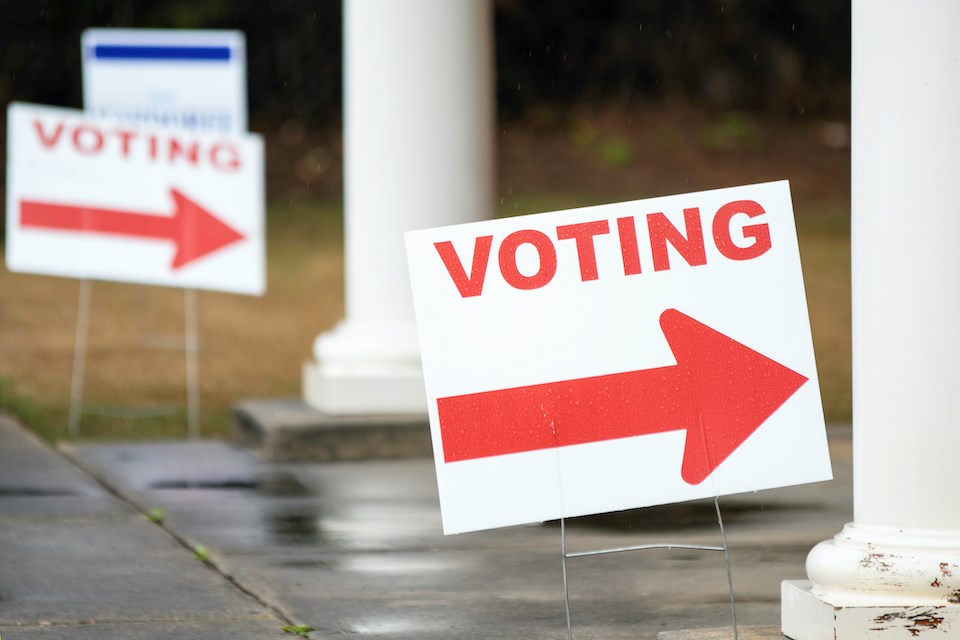Voters have a final chance to cast their ballots in the B.C. provincial election on Saturday, Oct. 19 — but many might feel compelled to stay home.
An atmospheric river will drench the southern B.C. coast with heavy rainfall on Friday and carry through Sunday. Saturday is expected to have the highest rainfall, with over 100 mm in some areas.
University of British Columbia (UBC) professor Richard Johnson held the Canada Research Chair in Public Opinion, Elections, and Representation until his retirement on June 30, 2020.
He tells V.I.A. that the dismal weather may dampen the odds people will turn out to cast their vote, particularly because it is the final day of the election.
"The people who care the most have already voted in terms of political commitment and interest," he remarks, noting that, historically, people who feel compelled to vote do it as early as possible.
"People who are available [on the final day] are in general less concerned and less informed and perhaps less optimistic."
Study looks at the effect of rain on voter turnout
Torrential rain could keep a less concerned or optimistic demographic at home. Researchers Søren Damsbo-Svendsen and Kasper M. Hansen conducted a study about the impact of rainfall on turnout for marginal voters.
The study looked at 34 others regarding rainfall-turnout effects across elections of varying importance, at different times, and with varying data types and research designs.
The research supports the hypothesis that "marginal voters are more susceptible to exogenous changes to the costs and benefits of voting." A rainfall warning is considered a "cost of voting" since it impacts the individual headed to the polls.
With the exception of first-time voters, the study found most young voters (people in their 20s and early 30s) were deterred from heading to the polls more than mature voters. Additionally, they were drawn to the polls on a sunny election day, indicating the weather plays a negative and positive role in bringing people to the polls.
Denmark is the ideal country to study the effects of rain on elections
Denmark was the ideal country for observing the effect of rainfall on turnout since the Danes have a strong sense of civic duty, a high percentile of voter turnout, high-salience elections, and an effective, automatic voter registration system. The small country is also flat, "geographically homogenous," and the database for voter behaviour and patterns is extensive.
Johnson says Canada's voting population has a myriad of factors to consider and isn't as easy to study as Denmark. The province of British Columbia isn't geographically homogenous and voter turnout is low.
While B.C.'s voter registration levels are high (around 96 per cent of eligible voters), Canada's federal voter turnout sits around 62.3 per cent, well below our neighbours to the south at 70.8 per cent. Demarks's federal elections have a turnout of 84.1 per cent of the eligible voting population, according to the International Institute for Democracy and Electoral Assistance.
Johnson also doesn't expect this election to drive people to the polls like others. He mentions how Justin Trudeau first captured the public's imagination in his first federal election and how Donald Trump's presidential running has sparked an outcry south of the border.
Still, Canada is experiencing an ousting of incumbent parties and leaders and the New Democratic Party (NDP) isn't as safe as it was during the pandemic, he says.
"Although the election is prospectively close, and we have seen this remarkable shakeup, I don't get the sense that there has been a key thing to mobilize people," he remarks.
"But conservatives have struck a nerve and we are sitting in an era and set of circumstances that are hard on incumbents. There are some pretty strong issues that are working against the NDP."
Johnson adds it's hard to say exactly how weather will affect voter turnout; Vancouverites are used to dealing with ample rainfall. However, torrential rain might make voters on the fence not show up.
"If it is really pouring, the younger and more marginal, they might give it a pass."



